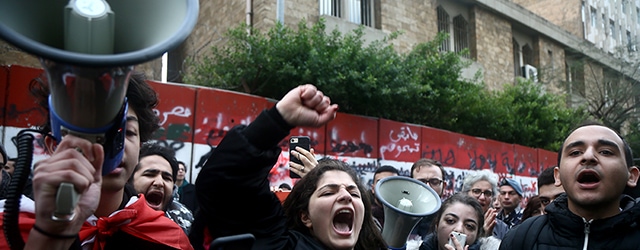Lebanon seems likely todefault on its bond obligations next week.
 Protesters gather outside of Lebanon’s central bank in Beirut. |
Lebanon appears increasingly likely to default on a $1.2 billion Eurobond repayment due next week, according to analysts. Two more bond tranches come due in the following months: $700 million in April and $600 million in June.
The choice between delivering investors a loss via default (“restructuring”) and the domestic stress incurred by paying up will not be easy, according to the latest MENA Economics Weekly report from Capital Economics. Venezuela went to extreme lengths to avoid default, the report says, because that would have left its oil exports and state-owned assets abroad at risk. Lebanon does not face those risks.
If the Gulf country manages to make the March payment, it will appease foreign investors—at least temporarily. On the other hand, defaulting would free up desperately needed cash.
“There is no chance they can afford to pay the debt,” says Lebanese-born Atif Kubursi, economics professor emeritus at McMaster University and former acting executive secretary of the United Nations Economic and Social Commission for Western Asia.
The crisis is unfolding against a troubled economic backdrop that includes limited foreign exchange reserves and rising public debt. In late February, Moody’s Investors Services and S&P Global Ratings downgraded the country’s long-term foreign currency rating to Ca and CC respectively.
Exacerbating conditions include a rapid drop in Lebanon’s currency—which is officially pegged to the dollar—on the parallel (black) market. Drawing down its 287 tons of gold reserves, worth around $15 billion, is not a workable solution as the reserves shore up the Lebanese pound, and devaluation would mean higher import costs for an already unhappy population. “This could be a major catastrophe,” explains Kubursi, who travels regularly to Lebanon. “With imports [comprising] 82% of what they consume, everything would be more expensive.” Services comprise roughly 75% of the economy, adding to the difficulty of bringing in hard currency.
The new coalition government, formed in late January after the prime minister resigned in the face of protests, is discussing assistance with the International Monetary Fund (IMF). However, financial support would likely come with unpalatable conditions. The new government is widely believed to be controlled, albeit indirectly, by Hezbollah—a heavily armed political party that rejects IMF controls (and is none too popular with other Gulf nation governments that might otherwise offer help). Hezbollah deputy leader Sheikh Naim Qassem noted pointedly that the party “will not accept submitting to [imperialist] tools … meaning we do not accept submitting to the International Monetary Fund to manage the crisis.” Thus, Lebanon has only accepted the IMF’s technical assistance so far.
Contributing to its lack of appeal, Lebanon ranks 137 out of 180 on Transparency International’s Corruption Perceptions Index 2019, putting it in the fourth quartile of most-corrupt countries.



